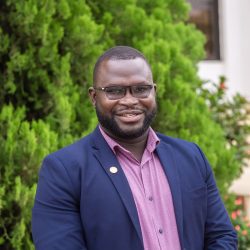Austin Dziwornu Ablo, University of Ghana (Ghana)
Research Project Title: Volarizing Informal Solid Waste Sector in Low-Income Communities
The central question addressed in this project is: How can the informal waste sector (IWS) be valorised to improve the environment and livelihood of urban citizens?
Urban resilience has become a central aspect of the drive towards making cities and human settlements liveable. Local governments in African cities’ focus on resilience stems from urban explosion accompanied by enormous challenges with infrastructure, solid waste management (SWM) and service provision. Consequently, several cities in Africa, including Accra, Ghana’s capital has been described figuratively by scholars as ‘wounded’. In the case of the SWM situation in Accra, this is even more disturbing given a complex mix of issue such as open and indiscriminate dumping of solid waste in drainage and open spaces, limited SWM infrastructure, irregular waste collection services by municipal assemblies and private waste collection companies, poorly maintained skips and sanitary sites, and limited capacity of existing recycling facilities.
Accra’s daily rate of waste generation increased from 1800 tons in 2004 to 2000 tons in 2007, 2200 tons in 2010 and 501 900 tons in 2018 when the city’s population was over 2 million. The average organic content of Accra’s solid waste is about 65% whereas that of paper and plastics are around 6% and 2.3% respectively. Sadly, the metropolis has one recycling facility and one transfer station which is owned and managed by private companies. Interventions implemented through development projects to solve Accra’s SWM challenges, such as the Accra Sanitary Sewer Stormwater Drainage Alleviation Project and the Kwabenya Engineered Sanitary Landfill project, also did not yield the intended results. Because these projects are often carried out using top-down approaches without including the voices of the local people whose activities directly or indirectly impact on the urban environment. The current top-down approach to SWM is detached from the reality and complexity of waste in cities.
Furthermore, the SWM privatisation, though a linchpin of the United Nations’ sustainable cities agenda, has failed to improve collection coverage for the city, making the private informal waste sector (IWS) become popular in Ghanaian cities and an integral part of the country’s SWM system. The IWS consists of private waste collection individuals such as waste pickers, itinerant and stationary waste buyers and informal reclaimers. In Accra, studies have shown that IWS collect (1313 tons) more than municipal /public actors (137 tons) and nearly as much collection as formal actors (1486 tons). Since their activities contribute immensely to urban environmental health and resilience to flooding, the study seeks to understand how the current operations of the IWS can be leveraged and scaled-up to improve SWM and livelihoods in low-income communities of Accra.
To do this, the research adopts a transdisciplinary approach (TDR) aimed at knowledge co-production, to promote the uptake and scaling up of IWS. The TDR entails the engagement of all stakeholders in the design and execution of a research project. Currently, I work with People’s Dialogue on Human Settlement (popularly called People’s Dialogue), a Ghanaian-based CSO working in poor communities to address a host of social, economic and environmental issues. As part of the design process, I have had series of meetings with officials of People’s Dialogue (PD) to understand the current state of SWM in the communities the work. The project will proceed with series of workshops with selected communities where PD currently operates. Community members, activists, officials of the assembly, will brainstorm to discuss issues related to SWM, waste segregation, collection, recycling and other activities that can be deployed to improve SW in the communities.
